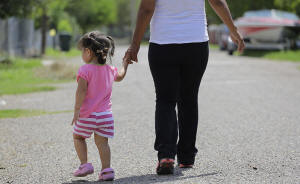Trump administration appeals Maryland judge's ruling blocking birthright
citizenship order
 Send a link to a friend
Send a link to a friend
 [February 12, 2025]
By MIKE CATALINI [February 12, 2025]
By MIKE CATALINI
President Donald Trump's administration on Tuesday said it's appealing a
Maryland federal judge's ruling blocking the president's executive order
seeking to end birthright citizenship for people whose parents are not
legally in the country.
In a brief filing, the administration's attorneys said they were
appealing to the 4th Circuit Court of Appeals. It's the second such
appeal the administration has sought since Trump's executive order was
blocked in court.
The government's appeal stems from U.S. District Judge Deborah
Boardman's grant of a preliminary injunction last week in a case brought
by immigrant rights groups and expectant mothers in Maryland. Boardman
said at the time her court would not become the first in the country to
endorse the president's order, calling citizenship a “precious right”
granted by the Constitution's 14th Amendment.
Tuesday's appeal is the latest volley over the president's birthright
citizenship order, which has generated at least nine lawsuits
nationwide, including suits brought by 22 states.
On Monday, a federal judge in New Hampshire in a similar lawsuit said
from the bench that he wasn't convinced by the administration's
arguments and issued a preliminary injunction. It applies to the
plaintiffs, immigrant rights groups with members who are pregnant, and
others within the court's jurisdiction.
And last week, a Seattle-based federal judge ordered a block of the
president's order, which the administration also appealed.
The lawsuits in the three cases revolve around the 14th Amendment to the
Constitution, ratified in 1868 after the Civil War and the Dred Scott
Supreme Court decision, which held that Scott, an enslaved man, wasn’t a
citizen despite having lived in a state where slavery was outlawed.
[to top of second column]
|

In this Sept. 16, 2015, photo, a woman in Sullivan City,
Texas, who said she entered the country illegally, walks with her
daughter who was born in the United States, but was denied a birth
certificate. (AP Photo/Eric Gay, File)

The amendment holds that “all persons born or naturalized in the
United States and subject to the jurisdiction thereof, are citizens
of the United States and of the State wherein they reside.”
The Trump administration, aiming to curtail unlawful immigration,
has asserted that noncitizens are not “subject to the jurisdiction”
of the United States and their children born in the U.S. are not
entitled to citizenship.
In 1898, in a case known as United States v. Wong Kim Ark, the U.S.
Supreme Court found the only children who did not automatically
receive U.S. citizenship upon being born on U.S. soil were children
of diplomats, who have allegiance to another government; enemies
present in the U.S. during hostile occupation; those born on foreign
ships; and those born to members of sovereign Native American
tribes.
The U.S. is among about 30 countries where birthright citizenship,
known as the principle of jus soli, or “right of the soil,” is
applied. Most are in the Americas and Canada and Mexico are among
them.
___
Associated Press writer Lindsay Whitehurst in Washington contributed
to this report.
All contents © copyright 2025 Associated Press. All rights reserved |